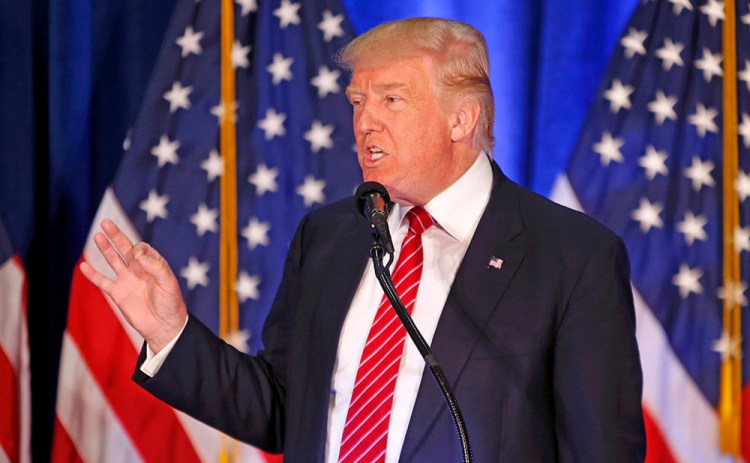Donald Trump is calling for “extreme vetting” of people looking to immigrate to or visit the United States, including an ideological screening test to weed out those who don’t “share our values and respect our people.”
A subdued Trump, delivering what his campaign billed as a major speech on terrorism in Youngstown, Ohio, said immigration would need to be stopped from “some of the most dangerous and volatile regions of the world that have a history of exporting terrorism,” but did not specify what they were.
Should he be elected president, Trump said he would ask the State Department and Department of Homeland Security to identify those places and stop processing visas for people looking to come to the United States from there.
“Those who do not believe in our Constitution, or who support bigotry and hatred, will not be admitted for immigration into the country,” Trump said. “Only those who we expect to flourish in our country – and to embrace a tolerant American society – should be issued immigrant visas.”
EXPANDING THE BAN
Trump has called for a temporary ban on all Muslims coming to the United States, and said in recent weeks he plans to expand it. He did not specifically name countries in his speech, but forcefully said that people who have “hostile attitudes” toward the United States must be blocked from coming, as well as those “who believe that sharia law should supplant American law.”
“Our new approach, which must be shared by both parties in America, by our allies overseas, and by our friends in the Middle East, must be to halt the spread of radical Islam,” Trump said.
Trump said he would call for an international conference focused on doing that and would partner with King Abdullah of Jordan, President Abdel Fatah al-Sissi of Egypt and Israel.
He laid out a broad, nonspecific plan for destroying the Islamic State, including joint and coalition military operations, cutting off funding, and shutting off access to the internet.
“Military, cyber and financial warfare will all be essential in dismantling Islamic terrorism,” Trump said. “But we must use ideological warfare as well.”
To do that, Trump said his presidential administration would oppose “oppression of women, gays and people of different faiths” and would be allies with, and amplify the voices of, “moderate Muslim reformers in the Middle East.”
Trump criticized the foreign policy of President Obama and Hillary Clinton when she was secretary of state, decrying it as “nation-building” and claiming it led the Islamic State to flourish around the world. Trump had claimed last week that Obama was the “founder” of the Islamic State, something he later dismissed as sarcasm. Trump said Clinton doesn’t have the judgment, temperament or “mental and physical stamina” to fight the Islamic State.
He ticked off a list of terrorist attacks that have taken place in the United States and Western Europe, and claimed that the world is now less safe than when Obama took office.
VALUES SHARED
Trump said he believes the U.S. and Russia could find “common ground” in the fight against the Islamic State.
“They too have much at stake in the outcome in Syria, and have had their own battles with Islamic terrorism.” Trump said.
Trump has praised Russian President Vladimir Putin and has called on Russia to find and release thousands of emails from Clinton. (He later said it was a joke.) U.S. officials said there is evidence that Russia was involved in a hack of emails and voice mails at the Democratic National Committee.
On Monday, a Ukrainian official said over $12 million in undisclosed payments were earmarked for Trump campaign manager Paul Manafort by the pro-Russian political party of Ukraine’s then-president, Viktor Yanukovych from 2007 to 2012. Manafort was a political consultant for Yanukovych at the time. He said Monday that he never received any off-the-books payment.
Send questions/comments to the editors.


